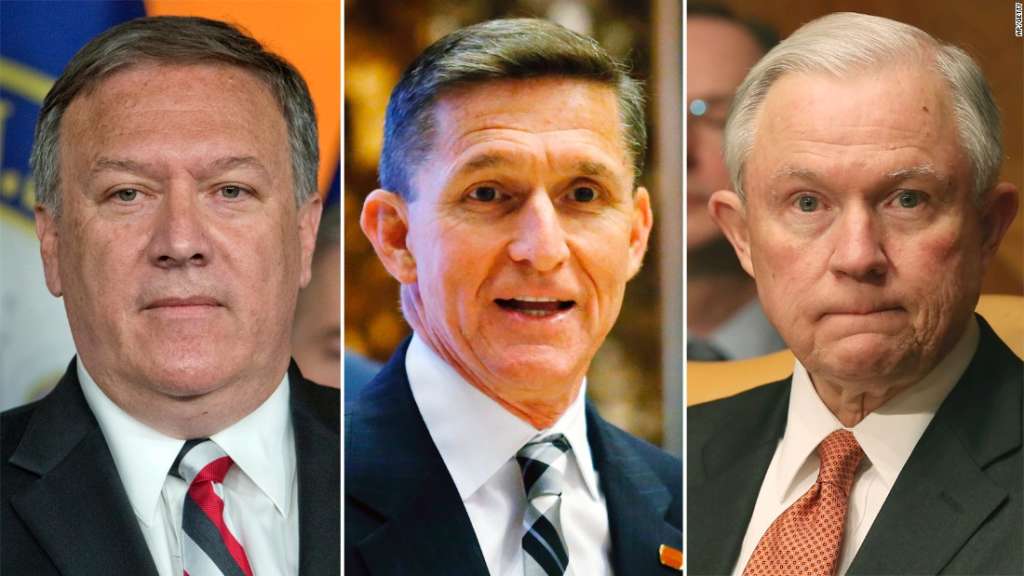New York, Washington-The recent appointments announced by U.S. President-elect Donald Trump on Friday were greeted with widespread applause by his core supporters and other Republicans.
However, these appointments raised the concerns of Democrats as they opposed the assignment of head of alt-right Breitbart News Network Steve Bannon to become chief strategist and senior adviser in the White House.
Trump, in filling the first of many top positions in his administration, has chosen three staunchly conservative Republicans to fill vital roles: Senator Jeff Sessions as his attorney general, Congressman Mike Pompeo as director of the Central Intelligence Agency (CIA), and retired Lieutenant General Mike Flynn as his national security adviser.
The nomination of anti-immigration Senator Sessions, 69, one of Trump’s earliest supporters during his electoral campaign, signals the president-elect is prepared to take his hard line on illegal immigration into the White House.
To lead the CIA, Trump tapped hawkish Congressman Pompeo, a strident opponent of the Iran nuclear deal and a sharp critic of Trump’s campaign rival Hillary Clinton during hearings into the 2012 attack on the U.S. mission in Benghazi, Libya.
The incoming commander-in-chief also appointed Flynn, a top military counsel to Trump, as his national security advisor.
“I enthusiastically embrace President-elect Trump’s vision for ‘one America,’ and his commitment to equal justice under law,” said Sessions, a 20-year veteran of Congress.
Trump described Sessions in a statement as having a “world-class legal mind.”
When Sessions was nominated for a federal judicial position 30 years ago, he was sharply criticized for racist remarks he allegedly made while serving as U.S. attorney in his home state of Alabama.
Sessions is also known for his anti-immigration position. He has opposed most immigration bills the Senate has considered over the past two decades, including those supporting legal immigration. And a Sessions aide helped the president-elect articulate his immigration policy.
While his picks suggest he is adhering to far-right positions, Trump made efforts to send reassuring signals about stability and continuity regarding America’s place in the world.
Pompeo, 52, said he would be “honored and humbled” to head the Central Intelligence Agency.
The Kansas lawmaker co-authored a report slamming then-secretary of state Clinton’s handling of the Benghazi attack, in which the U.S. ambassador to Libya and three other Americans died.
Deeper controversy surrounds Flynn, 57, who is set to play an influential role in shaping policy for a president with no experience in government or diplomacy.
Meanwhile, the President-elect met with a foreign leader for the first time: Japanese Prime Minister Shinzo Abe.
Some U.S. allies have been rattled by Trump’s campaign comments that questioned whether he would maintain U.S. loyalty to joint security arrangements and free trade accords.
Abe said after their New York meeting that he could have “great confidence” in Trump as a U.S. leader.
Trump and his transition team traveled Friday from Trump Tower to the Trump National Golf Club in Bedminster, New Jersey.
They planned to work through the weekend to fill other key positions in the administration.
On Saturday, Trump will meet with one of his most vocal Republican Party critics Mitt Romney.
“Will be working all weekend in choosing the great men and women who will be helping to MAKE AMERICA GREAT AGAIN!” Trump said on Twitter.
Romney — the moderate, failed 2012 presidential candidate — would be a long-shot choice for secretary of state, alongside former New York mayor Rudy Giuliani.
If chosen, Romney would bring a more orthodox Republican worldview to foreign policy.
In 2012, he described Russia as the top geopolitical threat — a sharp contrast to Trump, who has exchanged compliments with Putin.
Romney had described Trump as a “fraud,” rebuking the tycoon for proposals such as banning the entry of all foreign Muslims.
